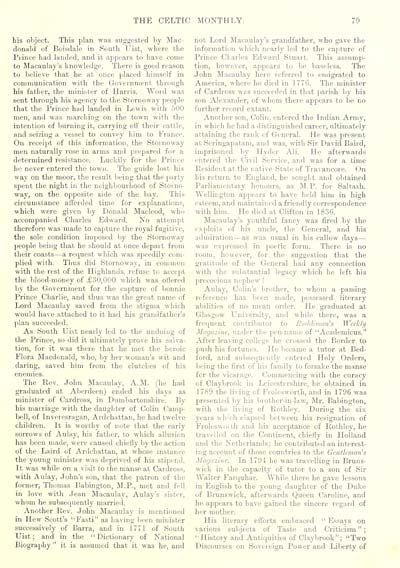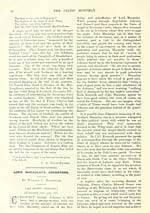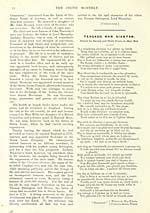Blair Collection > Celtic monthly > Volume 7, 1899
(117)
Download files
Complete book:
Individual page:
Thumbnail gallery: Grid view | List view

THE CELTIC MONTHT>Y.
79
his object. This plan was suggested by Mac
donald of Boisdale in South Uist, where the
Prince had landed, and it appears to have come
to Macaulay's knowledge. There is good reason
to believe that he at once placed himself in
communication with the Government through
his father, the minister of Harris. Word was
sent through his agency to the Stornoway people
that the Prince had landed in Lewis with .^OO
men, and was marching on the town with tlie
intention of burning it, carrying oft' their cattle,
and seizing a vessel to convey him to t'rance.
On receipt of this information, the Stornoway
men naturally rose in arms and prepared for a
determined resistance. Luckily for the Prince
ho never entered the town. The guide lost his
way on the moor, the result being that the party
spent the night in the neighbourhood of Storno-
way, on the opposite side of the bay. This
circumstance aflbrded time for explanations,
which were given by Donald Macleod, who
accompanied Charles Edward. No attempt
therefore was made to capture the royal fugitive,
the sole condition imposed l>y the Stornoway
people being that he should at once depart from
their coasts — a request which was speedily com-
plied with. Thus did Stornoway, in common
with the rest of the Highlands, refuse to accept
the blood-money of £30,000 which was oflered
by the Government for the capture of bonnie
Prince Charlie, and thus was the great name of
Lord Macaulay saved from the stigma which
would have attached to it had his grandfather's
plan succeeded.
As South Uist nearly led to the undoing of
the Prince, so did it ultimately prove his salva-
tion, for it was there that he met the heroic
Flora Macdonald, who, by her woman's wit and
daring, saved hiui from the clutches of his
enemies.
The Rev. John Macaulay, A.M. (he had
graduated at Aberdeen) ended his days as
minister of Cardross, in Dumbartonshire. By
his marriage with the daughter of Colin Camp-
bell, of Inveresragan, Ardchiittan, he had twelve
children. It is worthy of note that the early
sorrows of Aulay, his father, to which allusion
has been made, were caused chietiy by the action
of the Laird of Ardchattan, at whose instance
the young minister was deprived of his stipend.
It was while on a visit to the manse at Cardross,
with Aulay, John's son, that the patron of the
former, Thomas Babington, M.P., met and fell
in love with Jean Macaulay, Aulay's sistei-,
whom he subsequently married.
Another Piev. John Macaulay is mentioned
in Hew Scott's "Fasti" as having been minister
successively of Barra, and in 1771 of South
Uist; and in the "Dictionary of National
Biography " it is assumed that it was he, and
not Lord Macaulay's grandfather, who gave the
information which nearly led to the capture of
Prince Charles Edward Stuart. This assump-
tion, however, appears to be baseless. The
John Macaulay here leferred to emigrated to
America, where he died in 1776. The minister
of Cardross was succeeded in that parish by his
son Alexander, of whom there appears to be no
further record extant.
Another son, Colin, entered the Indian Army,
in which he had a distinguished career, ultimately
attaining the rank of General. He was present
at Seringapatam, and was, with Sir David Baitd,
imprisoned by Hyder Ali. He afterwards
entered the Civil Service, and was for a time
Resident at the native State of Travancore. On
his return to England, he sought and obtained
Parliamentary honours, as M.P. for Saltash.
Wellington appears to have held him in high
esteem, and maintained a friendly correspondence
with him. He died at Clifton in 1836.
Macaulay's youthful fancy was fired by the
exploits of his uncle, the General, and his
aduiiration — as was usual in his callow days —
was expressed in poetic form. There is no
room, however, for the suggestion that the
gratitude of the General had any connection
with the substantial legacy which lie left his
precocious nephew !
Aulay, Colin's brother, to whom a passing
reference has been made, possessed literary
abilities of no mean order. He graduated at
Glasgow University, and while there, was a
frequent contributor to Ruddiman's Weekhj
Magazine, under the pen-name of "Academicus."
After leaving college he crossed the Border to
push his fortunes. He became a tutor at Bed-
ford, and subsequently entered Holy Orders,
being the first of his family to forsake the manse
for the vicarage. Commencing with the curacy
of Olaybrook in Leicestershire, he obtained in
1789 the li\ing of Frolesworth, and in 1796 was
presented by his brother-in-law, Mr. Babington,
with the living of Rothley. During the six
years which elapsed between his resignation of
Froleswoith and his acceptance of Rothley, he
travelled on the Continent, chiefly in Holland
and the Netherlands; he contributed an interest-
ing account of those countries to the Ge7itleman's
Magazine. In 1794 he was travelling in Bruns-
wick in the capacity of tutor to a son of Sir
Walter Farquhar. While there he gave lessons
in English to the young daughter of the Duke
of Brunswick, afterwards Queen Caroline, and
he appears to have gained the sincere regard of
her mother.
His literary eflbrts embraced " Essays on
various subjects of Taste and Criticism " ;
'■History and Antiquities of Claybrook"; "Two
Discourses on Sovereign Power and Liberty of
79
his object. This plan was suggested by Mac
donald of Boisdale in South Uist, where the
Prince had landed, and it appears to have come
to Macaulay's knowledge. There is good reason
to believe that he at once placed himself in
communication with the Government through
his father, the minister of Harris. Word was
sent through his agency to the Stornoway people
that the Prince had landed in Lewis with .^OO
men, and was marching on the town with tlie
intention of burning it, carrying oft' their cattle,
and seizing a vessel to convey him to t'rance.
On receipt of this information, the Stornoway
men naturally rose in arms and prepared for a
determined resistance. Luckily for the Prince
ho never entered the town. The guide lost his
way on the moor, the result being that the party
spent the night in the neighbourhood of Storno-
way, on the opposite side of the bay. This
circumstance aflbrded time for explanations,
which were given by Donald Macleod, who
accompanied Charles Edward. No attempt
therefore was made to capture the royal fugitive,
the sole condition imposed l>y the Stornoway
people being that he should at once depart from
their coasts — a request which was speedily com-
plied with. Thus did Stornoway, in common
with the rest of the Highlands, refuse to accept
the blood-money of £30,000 which was oflered
by the Government for the capture of bonnie
Prince Charlie, and thus was the great name of
Lord Macaulay saved from the stigma which
would have attached to it had his grandfather's
plan succeeded.
As South Uist nearly led to the undoing of
the Prince, so did it ultimately prove his salva-
tion, for it was there that he met the heroic
Flora Macdonald, who, by her woman's wit and
daring, saved hiui from the clutches of his
enemies.
The Rev. John Macaulay, A.M. (he had
graduated at Aberdeen) ended his days as
minister of Cardross, in Dumbartonshire. By
his marriage with the daughter of Colin Camp-
bell, of Inveresragan, Ardchiittan, he had twelve
children. It is worthy of note that the early
sorrows of Aulay, his father, to which allusion
has been made, were caused chietiy by the action
of the Laird of Ardchattan, at whose instance
the young minister was deprived of his stipend.
It was while on a visit to the manse at Cardross,
with Aulay, John's son, that the patron of the
former, Thomas Babington, M.P., met and fell
in love with Jean Macaulay, Aulay's sistei-,
whom he subsequently married.
Another Piev. John Macaulay is mentioned
in Hew Scott's "Fasti" as having been minister
successively of Barra, and in 1771 of South
Uist; and in the "Dictionary of National
Biography " it is assumed that it was he, and
not Lord Macaulay's grandfather, who gave the
information which nearly led to the capture of
Prince Charles Edward Stuart. This assump-
tion, however, appears to be baseless. The
John Macaulay here leferred to emigrated to
America, where he died in 1776. The minister
of Cardross was succeeded in that parish by his
son Alexander, of whom there appears to be no
further record extant.
Another son, Colin, entered the Indian Army,
in which he had a distinguished career, ultimately
attaining the rank of General. He was present
at Seringapatam, and was, with Sir David Baitd,
imprisoned by Hyder Ali. He afterwards
entered the Civil Service, and was for a time
Resident at the native State of Travancore. On
his return to England, he sought and obtained
Parliamentary honours, as M.P. for Saltash.
Wellington appears to have held him in high
esteem, and maintained a friendly correspondence
with him. He died at Clifton in 1836.
Macaulay's youthful fancy was fired by the
exploits of his uncle, the General, and his
aduiiration — as was usual in his callow days —
was expressed in poetic form. There is no
room, however, for the suggestion that the
gratitude of the General had any connection
with the substantial legacy which lie left his
precocious nephew !
Aulay, Colin's brother, to whom a passing
reference has been made, possessed literary
abilities of no mean order. He graduated at
Glasgow University, and while there, was a
frequent contributor to Ruddiman's Weekhj
Magazine, under the pen-name of "Academicus."
After leaving college he crossed the Border to
push his fortunes. He became a tutor at Bed-
ford, and subsequently entered Holy Orders,
being the first of his family to forsake the manse
for the vicarage. Commencing with the curacy
of Olaybrook in Leicestershire, he obtained in
1789 the li\ing of Frolesworth, and in 1796 was
presented by his brother-in-law, Mr. Babington,
with the living of Rothley. During the six
years which elapsed between his resignation of
Froleswoith and his acceptance of Rothley, he
travelled on the Continent, chiefly in Holland
and the Netherlands; he contributed an interest-
ing account of those countries to the Ge7itleman's
Magazine. In 1794 he was travelling in Bruns-
wick in the capacity of tutor to a son of Sir
Walter Farquhar. While there he gave lessons
in English to the young daughter of the Duke
of Brunswick, afterwards Queen Caroline, and
he appears to have gained the sincere regard of
her mother.
His literary eflbrts embraced " Essays on
various subjects of Taste and Criticism " ;
'■History and Antiquities of Claybrook"; "Two
Discourses on Sovereign Power and Liberty of
Set display mode to: Large image | Transcription
Images and transcriptions on this page, including medium image downloads, may be used under the Creative Commons Attribution 4.0 International Licence unless otherwise stated. ![]()
| Early Gaelic Book Collections > Blair Collection > Celtic monthly > Volume 7, 1899 > (117) |
|---|
| Permanent URL | https://digital.nls.uk/75859881 |
|---|
| Shelfmark | Blair.59 |
|---|---|
| Additional NLS resources: | |
| Attribution and copyright: |
|
| Description | A selection of books from a collection of more than 500 titles, mostly on religious and literary topics. Also includes some material dealing with other Celtic languages and societies. Collection created towards the end of the 19th century by Lady Evelyn Stewart Murray. |
|---|
| Description | Selected items from five 'Special and Named Printed Collections'. Includes books in Gaelic and other Celtic languages, works about the Gaels, their languages, literature, culture and history. |
|---|

